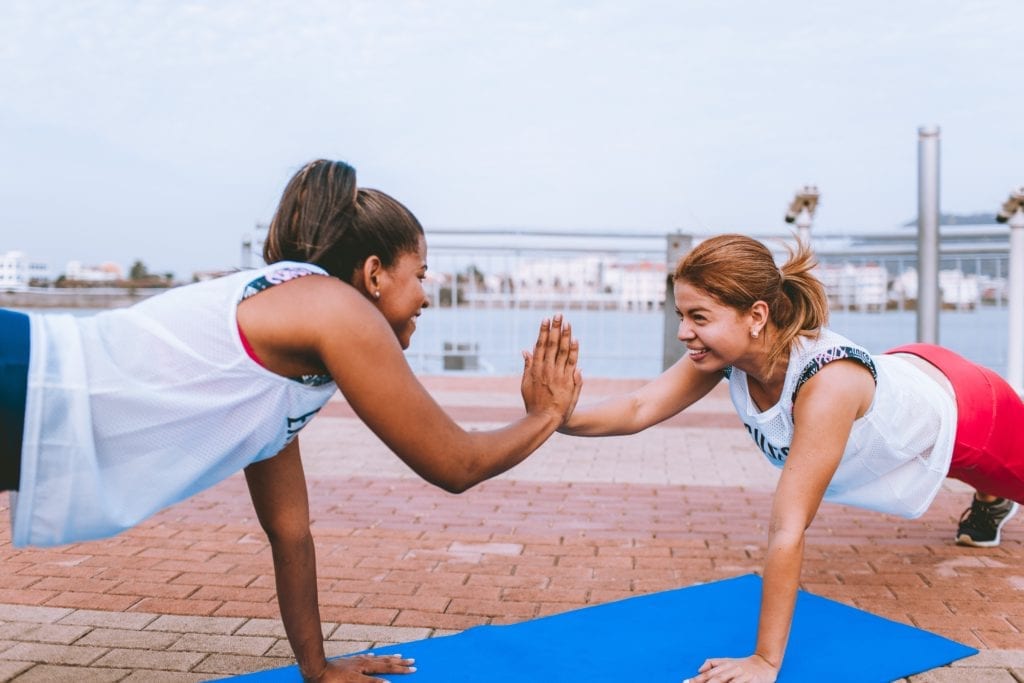I’ve always felt that exercising is important, but I have not put in the effort to make it a part of my life, until recently. I decided to put in the effort to keep to a schedule, even if I didn’t do any exercise at all.
Motivation to exercise comes down to putting in small efforts over time. Creating a healthy mindset through and around your efforts is what will ensure you’re successful.
I started to learn to give myself the freedom to choose the way I felt during my exercise sessions. If I was feeling too tired or too discouraged, I would acknowledge it and say, “OK, I did a good job just showing up.”
How to Feel Motivated to Exercise?

Your sitting in front of the television and thinking about how nice it would be to look like those people on TV or in that video. We all want to feel good and be happy, but for some of us, that seems impossibly out of reach.
If you talk to anyone who has changed their motivation and been able to change how their body looks, they’ll say it took time. We see the 30 days to beautiful body videos and ads all around but these are not how most people feel and look better.
For most people, it takes effort over time and it’s time that eludes them. They wonder how they can ever find time to accomplish their exercise goals. If you don’t have time, how can you be motivated to get anything done?
Discovering Your Inner Motivation

Attitude makes all the difference. It doesn’t matter how many times you’ve failed at your exercise attempts. It may certainly feel discouraging for most. You will be successful over time. I believe anyone can see benefits from creating a healthy
I’ve seen that anyone can be successful with an exercise program if they give themselves a chance. Each day of exercise is
When I get off course, I give myself credit for the little efforts I make. Even if it’s just planning, I think of all the efforts I’ve put in, and reassure myself that I’m doing OK.
If it’s the journey I’m focused on and not the destination, I feel better exercising
I feel better and exercise more. If I’ve gotten off track, I try to disregard those negative thoughts, feelings, or people and just have an enjoyable time exercising.
If I want to achieve a goal, I know it’s possible, and I don’t put a time requirement on it. Requirements are probably the worst thing I can do for myself.
If I lose motivation, I just show up to exercise and tell myself I don’t have to do anything I don’t want to do. I make it about changing my attitude so I can have an enjoyable experience.
Questions to Ask Yourself About Your Motivation?
- 1. Are you afraid of change?
- 2. Is there something or someone that’s keeping you from this goal, and is this thing or person a priority?
- 3. Are you unable or unwilling to keep a plan?
- 4. Are you unable or unwilling to set a specific goal?
- 5. Are you willing and able to talk to others about your experiences?
- 6. Are you willing to give yourself credit for any efforts you put into your goal(s)?
- 7. Are you willing to find out more about an exercise program and learn from others about what can help you?
- 8. Are you willing to try to keep your thinking positive, even if things get tough?
If you can find the
What’s Stopping Me From Exercising?

Before you change your schedule and start to exercise, you want to address some of the underlying reasons for your lack of motivation.
Some common reasons why people don’t exercise might be because they are tired, there’s too much on their plate, they don’t see any benefits so far, going to the gym is difficult, it feels too difficult, their schedule is inconsistent, and they feel discouraged or depressed.
Some people will tell you to just start exercising and then work on addressing issues that arise as you go. This may work for some, but may also be the reason you feel you can’t keep to a schedule and stop exercising.
Solutions for Lack of Motivation
- If sleep is a
problem , this will have an impact onyour exercise routine (article). Decide to make this something to work on for acouple of weeks before you exercise and it can have a real impact on motivation. - Check in on your water and food consumption. Are you getting enough water and nutrients to power your muscles and keep healthy bones and joints?
- I made a mistake of not enough drinking water before and during my exercise and running routine. I felt like exercise was so tiring and left me feeling down.
- I realized that I was only drinking 1-2 bottles of water a day, and my body needed much more than that.
- After a week or so of drinking water, my exercise became much more enjoyable and not tiring like before.
- Fear might be stopping you. Write out your goals and any concerns. Journaling will help voice exactly what thoughts and feeling you have, that you may not be able to express to others. (Amazon Link)
- Your goals should support you and encourage you to exercise, not create stress and disappointment, so you stop.
- Write what you want and how you want to accomplish it. Setting a start date is great. You can also set goals for what you want to achieve.
- Decide not to set goals that will discourage you from exercising. One goal might be, I will run a 5k marathon in 3 months. Then add, 5k is my goal but if I run 1k that’s progress and I can be happy with that too.
- Getting help from others can make a big difference. Just like your goals for exercise, your relations with others during your exercise program will increase or decrease your motivation.
- Try to find people you know will support you in your efforts and discuss as honestly as possible about your intentions. You don’t
need to discuss your specificgoals if that isn’t helpful. You’re looking for motivation to keep up with exercise and stick to a routine. - You can ask for help with checking in and showing support, having an exercise partner, and helping you make healthy choices that will aid you in continuing to exercise.
- Try to find people you know will support you in your efforts and discuss as honestly as possible about your intentions. You don’t
- A change in attitude is easier said than done. Self discouraging thoughts happen to everyone sometimes. Changing these thoughts will give you the freedom to try the exercises you want to try.
- Watch an inspirational video. These videos help me to recognize that others have been able to overcome difficult circumstances and I can do it too.
- Try meditation. If you are like me, you might feel distracted (article) much of the time. Slowing down my brain and just sitting
has helped me to get some perspective and feelcalmer . (Youtube Link)- I feel more willing to exercise because it doesn’t feel as stressful when thinking about it.
- Give yourself a reward for your efforts. We all work for
external rewards at times. Decide what will be your reward for continuing to exercise consistently.- A reward should be encouraging you to feel like exercising regularly even after you’ve received it and not put you off from exercising. If you’ve gotten your reward and don’t feel like or want to exercise anymore, then it’s the wrong motivation.
If you’re able to clear up some of the possible obstacles to exercising, then you’ll have a better chance of exercising in a more motivating way.
Finding the Time

You’ll find that time (article)is one of the first things on the list of advice that trainers, healthy individuals, and healthcare advisers will talk to you about.
This time problem is common for most people. It’s not that they can’t spare 30 minutes; it’s that 30 minutes don’t seem possible to use for exercise.
One thing to keep in mind is that over time, exercise will help you feel better. People say they have more energy and feel happier. Scientific research has given us proof that exercise helps people in these ways.
Exercise is not an instant fix, but it has many short-term and long-term benefits. That being said, exercising with small efforts over time will likely help individuals feel like they have more time.
Why do people who exercise feel like they have more time? They have more energy throughout the day and get more accomplished in a more efficient manner.
Get into a routine and stick with it. I’m not likely to have more time in my day, but I can adjust how I use my time to accomplish my exercise goals. Maybe get a smartwatch to help. (Amazon Link)
Here’s an example. Up at 6 am, leave for work at 7 am, leave from work at 5 pm, eat and rest until 6:30 pm, 6:30-9:30 flexible time. I have some flexible time, although it may be filled with things I need to do.
Considering that exercise is important to you, I hope take your flex time and make some decisions about how you can use it to your advantage. What works for you?
If nothing works for you, consider a different approach, adding more time to your day. Instead of getting up at 6 am,
A twenty-minute nap during the day will help you stave off fatigue if you have a long day. Exercise also helps people sleep better in general. So that’s good for obtaining more energy.
However research suggests that it may take 4 or more months of exercise to have a significant impact on sleep.
Another option is to multitask. Exercise with your kids, run while you’re talking on the phone, do laundry and TV exercise time, 10 push-ups or jumping jacks every 10 minutes for an hour, walk extra when out doing chores around town, do squats and the plank while cooking timer is on, and anything to get your heart rate up or tone your muscle during a minute or two.
All your efforts will add up. Slowly but surely, you start to feel and see small changes. It does accumulate even if we don’t notice it.
Exercise as a Lifestyle

I never decided to make exercise a priority until I recognized that it doesn’t have to be a chore. Exercise can be anything I enjoy doing that’s active.
I enjoy getting out into nature by hiking,
I think it’s important for those who have difficulties of one sort or another that prevent them from exercising regularly to make a decision that exercise is going to be a life
So, how can I change my motivation to exercise so that it becomes a lifestyle and not an extra activity to fit into my life?
Start by reading books and watching videos to help you gather lots of information and motivation for changes in attitude and action. I read Fitness is Religion and found it motivating. (Amazon Link)
You’ll find lots of motivating stories and some individuals who have gone through experiences just like yours and you can relate their journey toward success in exercising.
Give yourself a chance. Start by never pushing yourself past the breaking point. You’ll need to do some soul-searching to figure out what will discourage you and what will keep you motivated while exercising.
Start by being willing to show some empathy to yourself, not pity. If you’re struggling to get any exercise done, list what is going on that may be preventing you from doing what you’d like to get done.
Use some self-talk to tell yourself struggle is just part of the journey, to keep up with the effort, and to tell yourself that you’re glad that you’re continuing to work at it no matter how small the effort.
Be willing to be honest about your behaviors. Sometimes, I tell myself a little ice cream every day isn’t too bad. But if I’m willing
After some consideration, I am willing to recommit to not eating ice cream for a period of time.
There may be behaviors that are not in alignment with your goal to exercise. Deciding that these behaviors are limiting or hurting you. Then, you will better recognize what you’ll need to do to reduce and eliminate these obstacles.
If you’re not ready to give up the behaviors that are not in alignment with your exercise goals, then move on to the next step. We change over time and not all at once.
Doing what we can now will help us grow stronger and allow some obstacles that were difficult before to become much easier to put behind us.
Give yourself kudos for continuing exercise as a life habit. I personally support my exercise effort by recognizing that any effort I make, from 5 minutes to 90 minutes, is great. I can’t start criticizing how little I accomplished without losing some momentum to exercise.
While some may find it motivating to be hard on themselves so they can work harder next time, I find that it doesn’t work as a healthy exercise lifestyle.
There is such a thing as being too soft on oneself. This, too, can lead to less motivation to exercise. Try to focus on your effort and enjoy the process of exercise. Being supportive of your efforts and willing to see yourself as succeeding in your exercise attempts can lead to lifestyle changes over time.
Questions to Ask So You Can Make Exercise a Part of Your Everyday Life
- Which behaviors are helping me or hurting me? (These behaviors could be foods eaten, drugs or alcohol consumption, sedentary lifestyle, stress, attitude, interpersonal relationships, and exercise.)
- When have I been the happiest in my life?
- Was my happiness related to my health in any way?
- When have I been unhappy?
- Are there any behaviors during this time that have affected my health in any way?
- How much money am I spending on any unhealthy behaviors in terms of product(s) and medical expenses? (Think about the entire time of your adult life.)
- How much of an effect do my behavior(s) have on my health?
- Are you concerned about any health problems related to unhealthy behaviors?
- What behaviors concern you the most?
- Are my behaviors causing problems with my relationships?
It is good for me to see what behaviors I have that are interfering with a healthy lifestyle. I don’t need to put myself
If I can honestly see the results of my behaviors and how they are influencing my health and happiness, then I can determine if I want to put in the effort to change any of these behaviors.
Believe In Yourself

I believe you can change whatever you’re willing to focus on with effort over time. It may not be natural to do, but it will become a habit and then you’ll be surprised how easy an effort your new behavior can be.
My exercise program is continuing to evolve over time and helps me make other healthy lifestyle changes a bit easier.
I have no doubt you will do a great job of making exercise a part of your life if that’s what you want. You’ll need small efforts over time and a willingness to find what exercises and activities you can enjoy. Give yourself a little praise for reading this article, too!
Thanks for visiting Helpshoe.com
Related Questions
Why is it so hard to exercise?
Your body needs time to change and adjust to stress. Exercise puts stress on your heart, bones, and muscles. These stresses are good for you and eventually lead to a great number of health benefits.
How do you lose weight genetically?
Eating healthy, exercising regularly, and reducing stress will help your genes express changes that will help your body lose fat. Your genes may need you to do more exercise, eat more whole foods, or reduce stress to provide the signals needed for change.


